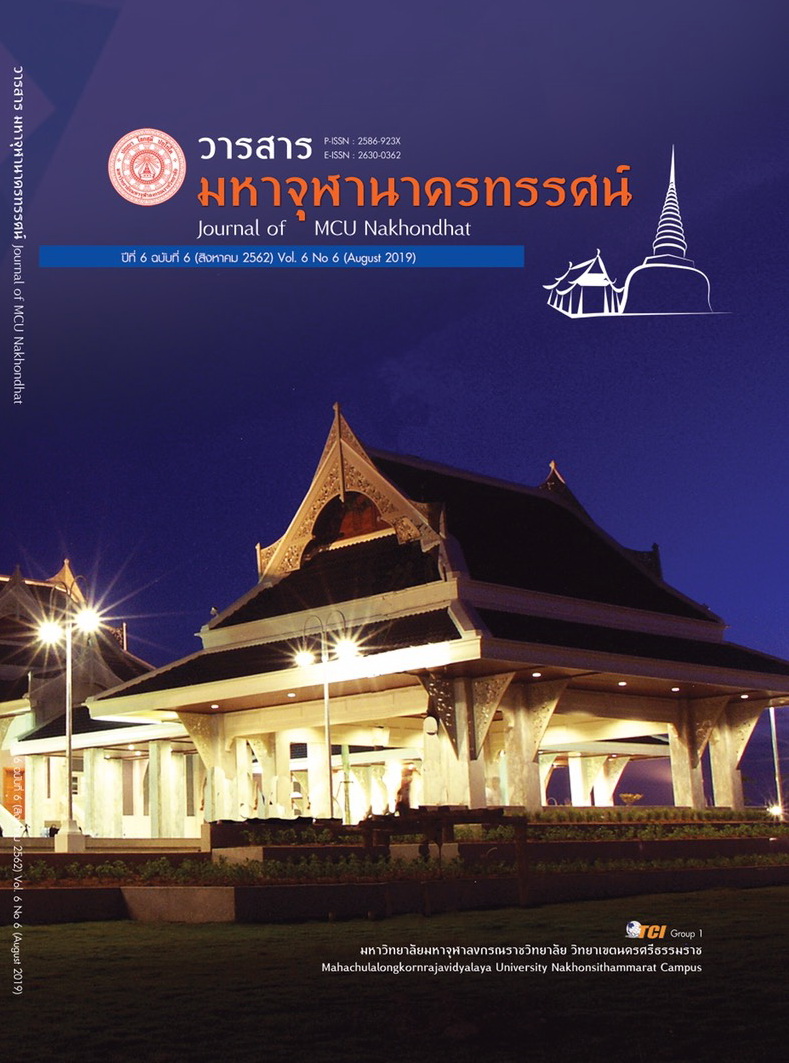BUDDHIST PSYCHOLOGY MODEL TO ENHANCE SALES PERSON'S PERFORMANCE
Main Article Content
Abstract
Buddhist psychology model to improve the performance of salesman. The objectives were 1) To study the current situation in sales, the problems, and the demand for performance improvement. 2)To study the factors that affect to the performance improvement of the salesman as Buddhist psychology model, and 3) To present the Buddhist psychology model for performance improvement of salesman by using mixed methods research, firstly, Qualitative Research; the data were collected from documentation to write an interview sheet for interviewing 15 informants. The interview questions were checked by experts. secondly, Quantitative Research by the questionnaires for a salesman at a department store in Bangkok 400 people and statistical analysis data were frequency, percentage, average, standard deviation, and Pearson’s Product Moment Correlation Coefficient.
The results showed that the current situation in sales, the problems, and the demand of performance improvement as a salesman has not enough products knowledge, no sales presentation skills to increase sales, no work experience, no training on service and speaking skills to convince customers. the guidelines to improve performance; most of the salesman needs to get products knowledge, and training on sales services. The importance of training programs was training workshop, seminar, study visit, team building activities, the configurations, and factors that affect to the performance improvement of the salesman as Buddhist psychology model, there were selected 26 topics. Firstly, internal management 11 topics. Secondly, building relationships with customers 12 topics, and the last one, product selling and services 11 topics. As the results of this research called “3C 4D 4T Model”.
Article Details
References
ณรงค์ ศรีเกรียงทอง และพิทักษ์ ศิริวงศ์. (2558). สภาพปัญหา ความต้องการของแรงจูงใจภายใน/ภายนอก และสวัสดิการของพนักงานที่ปรึกษางานขาย PC และพนักงานที่ปรึกษาด้านความงาม BA ของ บริษัท โมเดิร์สคาสอินเตอร์เนชั่นแนลคอสเมติกส์ จำกัด.
Veridian E-Journal, Slipakorn University ฉบับภาษาไทย สาขามนุษยศาสตร์ สังคมศาสตร์ และศิลปะ, 8(2), 72-83.
ธีรพงษ์ แสนเจียม. (2559). ยุทธศาสตร์การพัฒนาความรู้และทักษะที่จำเป็นเกี่ยวกับงานบริการของพนักงานขายและหัวหน้างาน : กรณีศึกษาบ้านมิสเตอร์โดนัท โซน 14. ใน วิทยานิพนธ์ศิลปศาสตรมหาบัณฑิต คณะศิลปศาตร สาขาวิชายุทธศาสตร์การพัฒนา. มหาวิทยาลัยราชภัฏสกลนคร.
ประภาศรี สวัสดิ์อำไพรักษ์. (2556). การส่งเสริมการตลาดในธุรกิจบริการ ประมวลสาระชุดวิชา 32710 สัมมนาการจัดการการตลาด. นนทบุรี: สำนักพิมพ์มหาวิทยาลัยสุโขทัยธรรมาธิราช.
ปาลิตา แซ่ก้วง. (2557). สมรรถนะ การเห็นคุณค่าในตนเอง และความสุขในการทำงานส่งผลต่อประสิทธิภาพในการปฏิบัติงานด้านการขายของพนักงานขายในเขตกรุงเทพมหานคร. มหาวิทยาลัยกรุงเทพ.
ลักษณ์สุภา พึ่งผล และมณฑล สรไกรกิติกูล. (2561). การใช้เรื่องเล่าในการพัฒนาทักษะการขาย. MFU Connexion, 7(2), 127-138.
วีรยา ภัทรอาชาชัย. (2539). หลักการวิจัยเบื้องต้น พิมพ์ครั้งที่ 3. กรุงเทพมหานคร: อินเตอร์เทคพริ้นติ้ง.
สถาบันคุณวุฒิวิชาชีพ (องค์การมหาชน). (2557). รายงานประจำปี 2557. กรุงเทพมหานคร: สถาบันคุณวุฒิวิชาชีพ (องค์การมหาชน).


